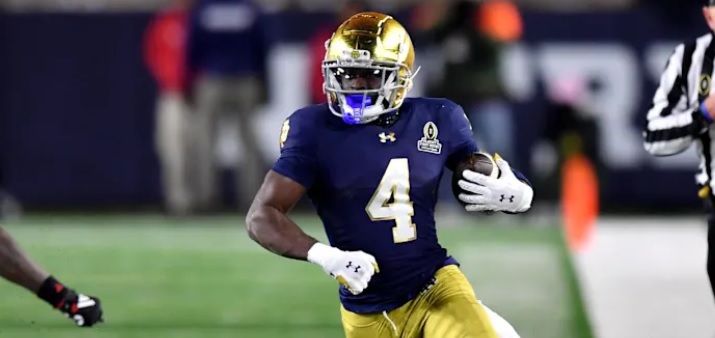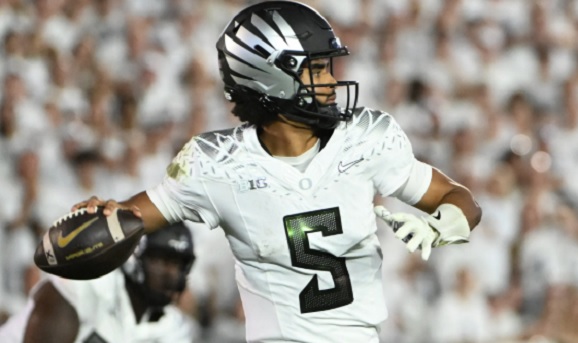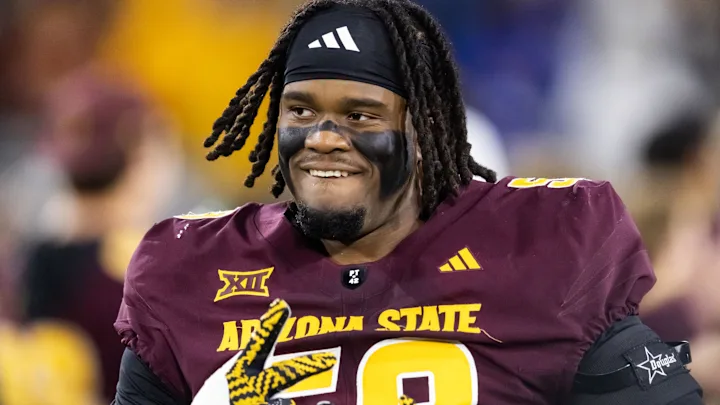By Charlie Campbell – @draftcampbell
April 30, 2019
Winners
 Washington Redskins:
Washington Redskins: - Dwayne Haskins, QB, Ohio State

- Montez Sweat, DE, Mississippi State

The Redskins got a lot of praise for their draft, and it was well deserved. But the media hasn’t been paying attention to the fact that this was keeping in the tradition of recent years for Washington, which had some good drafts in 2018 and 2017. The Redskins are building a talented team of pure football players who are big, tough and physical. Their new quarterback and edge rusher are perfect fits.
Haskins has a cannon for an arm and was an accurate passer for Ohio State last season. He really had an excellent year for the Buckeyes and showed a ton of upside for the NFL as a pocket passer. Sweat was one of the top edge rushers in the SEC over the past two years and possesses a dynamite skill set of speed, length, and some natural strength. Sweat could form a lethal defensive line with Jonathan Allen, Da’Ron Payne and Ryan Kerrigan. It would not surprise me at all if this Redskins draft class lays the foundation for the team to become a consistent playoff contender year after year for many seasons to come.
 Buffalo Bills:
Buffalo Bills: - Ed Oliver, DT, Houston

Many thought that the Bills would have to trade up to land Oliver in the first roundm but they were able to stay put at the ninth pick and select Oliver. From a schematic perspective, the Oliver is a great fit for Sean McDermott as an interior disruptor and speed rusher to get after the quarterback. The Bills played the draft well, not panicking and giving up resources in draft picks to land their defensive cornerstone. Alongside 2018 first-round linebacker Tremaine Edmunds and 2017 first-round cornerback Tre’Davious White, Buffalo now has building blocks at each level of the defense. Landing Oliver in the first round of the 2019 NFL Draft was a big win for Buffalo.
 New York Giants:
New York Giants: - Daniel Jones, QB, Duke

- Dexter Lawrence, DT, Clemson

- DeAndre Baker, RB, Georgia

I’m a contrarian in the media for thinking the Giants had a really good draft and Round 1. The pick of Daniel Jones was slammed by the national media and many fans, but I wonder how much Duke football these critics actually watched over the past few years. I watched plenty of Jones over his college career, as our college-game recaps suggest, and I don’t believe it was bad pick at all to take him to be their franchise quarterback. Jones has a good skill set with a quality arm, athleticism and intelligence. He is an accurate passer who shows advanced field vision and understanding of where his receivers are going to be on any play. Jones doesn’t possess the skill set of Cam Newton or the polish of Andrew Luck, but every quarterback taken outside of the very top of the draft has some flaws and points of improvement. Jones is capable of being a franchise quarterback.
Lawrence is a safe pick to be a difference-maker at nose tackle for the Giants. The massive defensive tackle has a ton of upside as only a true junior with power and quickness at the point of attack. It wouldn’t surprise me if Lawrence is this generation’s Vince Wilfork. Baker was one of the best corners in the college football over the past two seasons and an essential part of the Georgia defense. Landing a quarterback of the future, a difference-maker for the defensive line, and a No. 1 corner on the opening night of the draft was definitely a big win for the Giants.
Losers
 Atlanta Falcons:
Atlanta Falcons: - Chris Lindstrom, G, Boston College

- Kaleb McGary, OT, Washington

Many around the league thought that Lindstrom was a fringe first-rounder who could be worthy of going in the 20s, but the Falcons selected him the 14th-overall pick. While that was a bit of a reach, Atlanta doubled down by trading back into the first round for McGary. In speaking with sources at other teams, they had McGary graded on the second day of the draft and this trade up looks very unnecessary. Atlanta also took McGary over other tackles who had higher consensus grades around the league. That group included Florida’s Jawaan Taylor, Oklahoma’s Cody Ford and Ole Miss’ Greg Little. The members of that group all possess better athletic skill sets than McGary with more athleticism, quickness, and not being size deficient. On top of those players being more physically gifted than McGary, some of them, like Ford, are more developed mentally, as there were teams that had concerns about McGary’s football I.Q.
The Falcons could have waited to the second round of the draft to move up for McGary and paid a cheaper price to do it. Thus, they are one of the losers from the opening night of the draft after two reaches and paying extra picks to make the second one.
 Houston Texans:
Houston Texans: - Tytus Howard, OT, Alabama State

The Texans’ mistake was similar to Atlanta with a reach on an offensive lineman. Many teams had Howard graded as a third-round pick and they thought he would go in the second round because of the need for tackles. After Philadelphia jumped Houston for Washington State left tackle Andre Dillard, the Texans reached for Howard, taking him over better offensive tackle prospects like Florida’s Jawaan Taylor, Oklahoma’s Cody Ford and Ole Miss’ Greg Little. Howard has a good skill set with a lot of upside, but he needs development for the NFL. That could be seen at the Senior Bowl where he showed improvement, but still had some issues with the better competition. The Texans are in win-now mode as Jadeveon Clowney is probably in his final year with the team, J.J. Watt is showing signs of age, and Whitney Mercilus and Johnathan Joseph are declining. Taking a project at left tackle in the first round doesn’t make sense for a team that is trying to win now.
During Bill O’Brien’s six-year tenure with Houston, the team has failed to develop offensive linemen. In O’Brien’s fifth season, the Texans fielded a terrible blocking front that led to Deshaun Watson having to be bused to games to protect a lung injury. Coming from South Alabama, Howard is going to need good coaching and time to develop. Considering the track record in Houston, he won’t get the coaching development that you see with other teams, like New England or Carolina, that have consistently groomed linemen into being solid pros. If general manager Brian Gaine had been a little more aggressive, the Texans could have moved up a little for Dillard and come away with the best pass-blocking left tackle in the draft to protect their vulnerable franchise quarterback. Instead, Houston ha to hope Howard can make a quick jump from South Alabama to the NFL.
 Seattle Seahawks:
Seattle Seahawks: - L.J. Collier, DE, TCU

Seattle traded down, but then ended up not getting good value for its first-round pick. In speaking to sources at a variety of teams, Collier was graded as a mid-round pick and the Seahawks reached on him in the top 30. At TCU, playing in a conference that throws the ball constantly and does not field many talented offensive lines, Collier’s best season of sack production came with only six sacks, and during previous years, he had four and 4.5 sacks respectively. He also had a good rusher on the other side from him in Ben Banogu who drew attention. There were sources at other teams who liked Collier’s run-defense skills as he is strong and plays hard. But they also felt that he has a terrible, soft body that needs a lot of development for the NFL. In speaking to staffers at other teams, they felt that Collier was the biggest reach in the first round of the 2019 NFL Draft.
Go to Winners and Losers – Day 2
NFL Picks - Feb. 9
2026 NFL Mock Draft - Feb. 5
Fantasy Football Rankings - Jan. 29
NFL Power Rankings - Jan. 26



